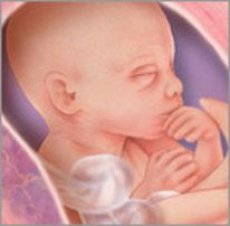Medical expert of the article
New publications
Pregnancy: 21 weeks
Last reviewed: 08.07.2025

All iLive content is medically reviewed or fact checked to ensure as much factual accuracy as possible.
We have strict sourcing guidelines and only link to reputable media sites, academic research institutions and, whenever possible, medically peer reviewed studies. Note that the numbers in parentheses ([1], [2], etc.) are clickable links to these studies.
If you feel that any of our content is inaccurate, out-of-date, or otherwise questionable, please select it and press Ctrl + Enter.

How the child grows:
Your baby already weighs 350 grams and is 25 cm tall. You can feel his movements very well, which become stronger as he grows. The baby already has eyebrows and eyelids.
Important: Each baby's development is unique. Our information is designed to give you a general idea of fetal development.
Changes in the expectant mother
You are probably feeling quite comfortable because your belly is not yet too big and you are not bothered by early pregnancy symptoms. If you are feeling well, relax and enjoy it. This does not mean that you will not experience some minor problems, such as increased oiliness of the skin, which contributes to acne. If you have experienced such changes, try to thoroughly cleanse your skin with a special product. Do not take medications for acne - some of them are dangerous during pregnancy.
At this stage, you are more prone to varicose veins. Pregnancy increases the pressure on the veins of the legs, and higher levels of progesterone can aggravate the problem. Varicose veins are also caused by genetic factors and age category. To prevent or minimize varicose veins, it is necessary to perform daily physical exercises.
You may also develop what are called spider angiomas (a group of tiny blood vessels on the surface of the skin), especially on your ankles, legs, and face. Although they are unsightly, spider angiomas are not uncomfortable and usually disappear after childbirth.
3 Questions About... Sex During Pregnancy
- How acceptable is it to crave sex during pregnancy?
Some pregnant women notice an increased libido during pregnancy. Increased blood flow to the pelvic area, heightened sensitivity to arousal, and increased vaginal lubrication due to hormonal changes can all contribute to increased sexual desire. As one expectant mother told BabyCenter, "The hormones have turned me into a sex machine! I seem to want sex more and more often." It's also normal to have a complete lack of sexual desire. If you're experiencing discomfort, soreness, and feeling unattractive, all of this can affect your sexual appetite.
- What are the most comfortable positions during pregnancy?
More than 75 percent of expectant parents who took part in the survey said they experimented with different positions during pregnancy. The favorite for most couples was the "side" position.
- Are there any taboos regarding sex during pregnancy?
You should abstain from sexual intercourse if you experience any of the following conditions or symptoms:
- placenta previa
- premature birth
- unexplained vaginal bleeding or discharge
- abdominal cramps
- cervical insufficiency
- enlarged cervix
You should also avoid sexual intercourse if you or your partner has herpes. Avoid sexual intercourse with your partner for the entire third trimester if your partner has had herpes before, even if there are no symptoms now. The same applies to oral sex. Finally, avoid sexual intercourse if you or your partner has any other sexually transmitted infection. There are other situations in which your pregnancy care provider will advise abstinence.
This week's activity: Create a gift list. Even if you don't like the idea of ordering gifts, your friends and family will still ask you about them. Preparing a gift list will save you time wasting on further discussions and unnecessary gifts.


 [
[